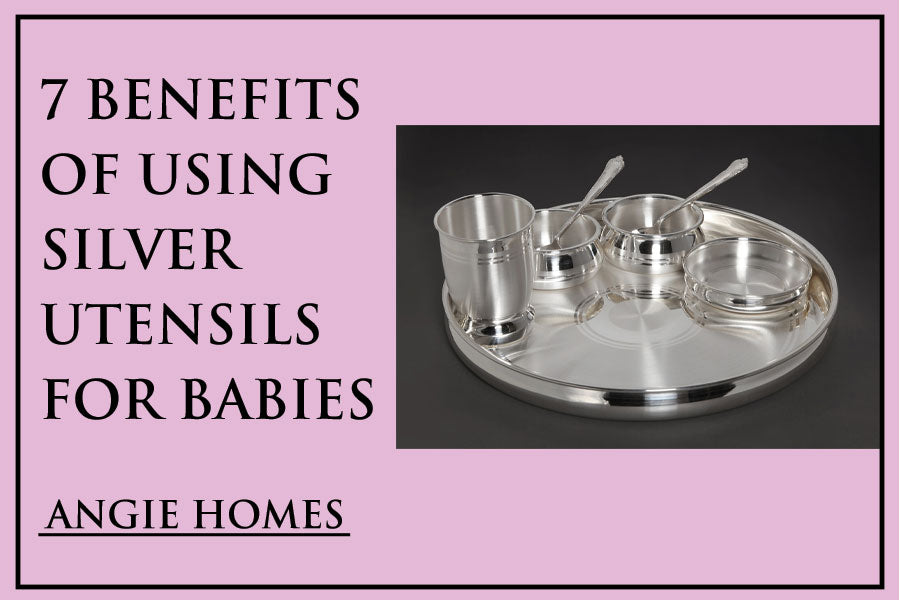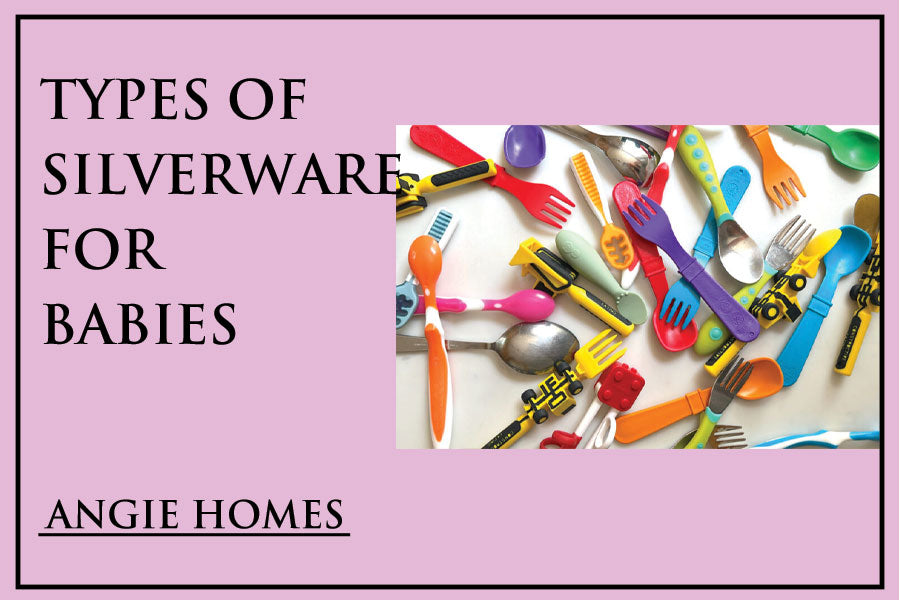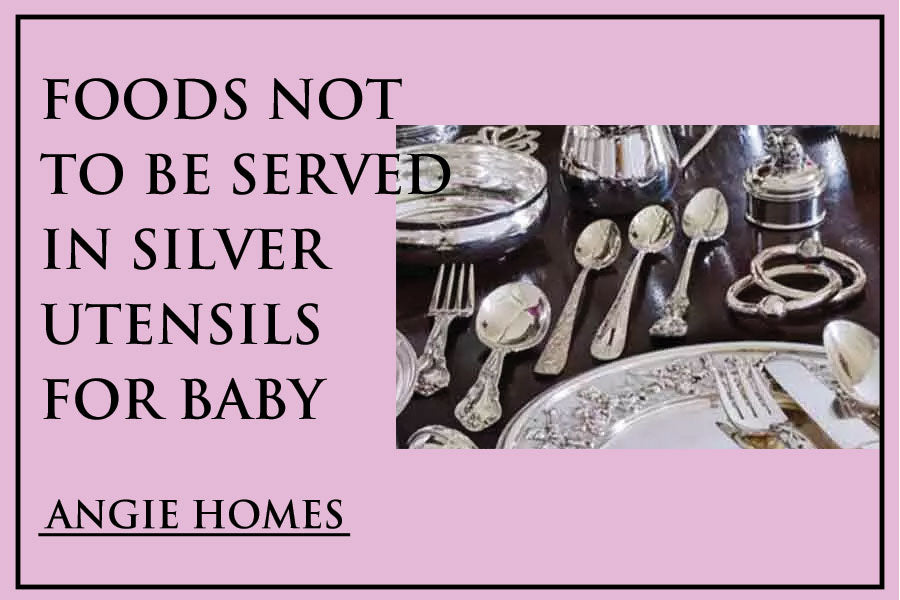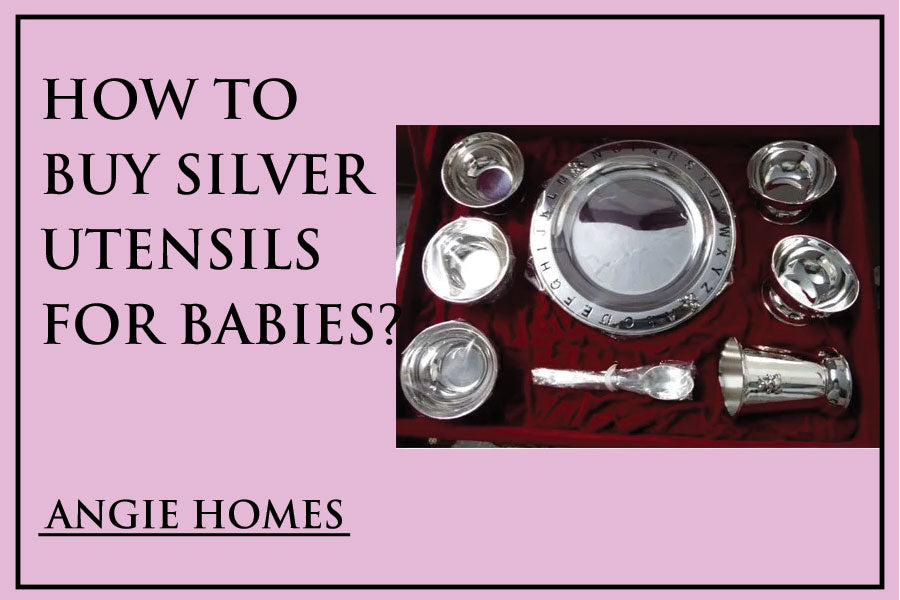Introduction
Introducing silverware to toddlers is an essential developmental milestone that is going past mere mealtime etiquette. The transition from palms to forks and spoons performs a pivotal position in improving satisfactory motor competencies, hand-eye coordination, and self-feeding competencies. This essential step now not only fosters independence but also cultivates a healthy courting with food from an early age.
The significance of introducing Using Silverware for Babies lies in promoting sensory exploration, encouraging correct chewing, and facilitating the development of oral motor abilities. By incorporating utensils right into a child's feeding, parents make contributions to the general cognitive and physical improvement of their child. Additionally, the social aspect of one's own family food is enriched as infants discover ways to mimic the conduct of those around them. While the benefits are massive, it's miles essential to exercise caution and choose age-suitable utensils to make certain protection. Supervision is fundamental in the course of this gaining knowledge of method, and parents need to bear in mind capacity choking risks. Balancing encouragement with staying power and introducing silverware to babies becomes a precious and profitable experience in nurturing their growth.
Why Is It Recommended To Use Silverware For Babies?

The tactile enjoyment of managing silverware also promotes sensory exploration, aiding in the development of essential neural connections. Firstly, this exercise complements exceptional motor capabilities and hand-eye coordination as babies draw close, manoeuvre, and convey utensils to their mouths. Beyond the physical aspects, the use of Silverware for Babies encourages self-feeding, fostering independence and a sense of accomplishment in infants. This newfound autonomy in mealtime activities plays an important position in their cognitive and emotional development. Moreover, introducing utensils early on contributes to the established order of healthy consuming conduct, promoting proper chewing and aiding in the improvement of oral motor skills.
The social component of own family food is enriched as infants look at and mimic the conduct of those around them. This shared experience no longer only promotes a nice attitude in the direction of meals but also establishes a basis for social interactions. Furthermore, incorporating silverware right into a baby's feeding routine facilitates creating a structured and enjoyable mealtime environment, laying the foundation for a lifelong appreciation for diverse ingredients.
7 Benefits Of Using Silver Utensils For Babies

Silver introduces utensils to babies that can offer more than a few blessings that pass beyond the mere practicality of mealtime. From selling developmental milestones to influencing dietary behaviour, here are seven benefits of incorporating silverware into a toddler's feeding:
-
Fine Motor Skill Development:
Using silver utensils calls for infants to exercise satisfactory motor abilities as they grasp and control the utensils. This movement strengthens the muscle tissue of their palms and hands, contributing to superior dexterity and coordination. Repeated actions in self-feeding with silverware assist in the refinement of these crucial motor abilities during a period of rapid improvement.
-
Sensory Exploration:
Using Silverware for Babies provides babies with a completely unique sensory revel. The tactile sensation of protecting and exploring special textures contributes to their basic sensory improvement. Babies learn about the arena around them through contact, and incorporating silverware into their food provides a precious length to their sensory exploration. This can enhance their cognitive improvement by stimulating neural connections associated with contact and texture.
-
Independence and Self-Feeding:
The creation of silver utensils encourages independence in toddlers as they transition from being spoon-fed to self-feeding. The act of keeping a spoon or fork and bringing it to their mouth empowers toddlers, instilling a feeling of autonomy in their mealtime activities. This newfound independence is not only an effective developmental milestone but also an essential step toward organizing wholesome eating habits and self-sufficiency.
-
Cognitive and Emotional Development:
The system of using silverware includes more than simply physical movements; it engages cognitive and emotional elements properly. Babies research motive and effect as they effectively carry meals to their mouths through the usage of utensils. This interactive revel fosters cognitive improvement by way of strengthening their expertise in spatial relationships and hand-eye coordination. Additionally, the wonderful reinforcement of undertaking this challenge contributes to emotional development and a high-quality mindset toward mealtime.
-
Establishment of Healthy Eating Habits:
Introducing Silverware for Babies allows babies to improve their eating behaviour. As they discover ways to manipulate the utensils, additionally, they learn to manage the pace of their consumption and broaden their capacity to chew and swallow food effectively. This early exposure to self-feeding can make a contribution to a superb dating with food, encouraging a varied and nutritious weight loss plan as they grow. It sets the inspiration for a lifetime of aware and healthful consuming behaviour.
-
Social Interaction and Family Bonding:
The use of silver utensils throughout the circle of relatives food creates a shared experience that goes past the dietary element. Babies study and mimic the eating behaviours of those around them, fostering social interplay and bonding within the circle of relatives. This communal factor of mealtime contributes to a fantastic ecosystem, selling a feeling of belonging and reinforcing the importance of shared activities. As babies actively participate in food with silverware, they become indispensable members of their own family dining revel in.
-
Introduction to Cultural Norms:
Using silver utensils exposes babies to cultural norms related to mealtime practices. Different cultures have unique utensils and eating traditions, and early exposure permits babies to conform to numerous culinary environments. This cultural cognizance from an early age can contribute to open-mindedness and recognition of diverse foods and customs, laying the groundwork for an extra inclusive and various palate as they grow older.
Types Of Silverware For Babies

Choosing the proper forms of silverware for infants is crucial to ensure their protection, consolation, and successful transition to self-feeding. Here are several types of baby-friendly silverware options:
- Soft-Tipped Spoons: Soft-tipped spoons crafted from materials like silicone or rubber are splendid alternatives for introducing silverware to infants. The tender texture is mild on their gums and teeth, making it a cushy option for early self-feeding tries.
- Bendable or Flexible Spoons: Utensils with a bendable or bendy format are especially beneficial during the early stages of self-feeding. These spoons adapt to the kid's moves, making it much less complex for them to navigate food from the bowl to their mouths.
- Grasping Handles: Silverware with ergonomic and clean-to-draw close handles is critical for promoting unbiased feeding. Handles with a textured or non-slip grip provide infants with higher manage, letting them keep the utensils hopefully.
- Short-handled Utensils: Opting for utensils with shorter handles is realistic for tiny fingers. Shorter handles provide higher manoeuvrability and control for toddlers who are definitely starting to explore self-feeding.
- Wide-Grip Forks: When introducing forks, choosing people with a much broader grip can make it easier for infants to hold and stab food. The wider grip carries their growing motor skills, selling a hit self-feeding reports.
- Plastic-Coated or Wooden Utensils: For dad and mom who determine the possibility of substances, plastic-covered or wooden utensils may be appropriate alternatives. These substances are mild-weight, and the easy surfaces are gentle on gums and teeth.
- Divided Plates with Attached Utensils: Some silverware units for toddlers include divided plates which have attached utensils. These sets regularly function in colourful designs and might make mealtime greater appealing for infants, encouraging their hobby of self-feeding.
- Safe Stainless Steel Options: If choosing metallic utensils, make sure they are particularly designed for toddlers, with rounded edges and no sharp factors. Stainless metal options may be secure as they should be crafted for infant use; however, they constantly prioritize protection talents.
Tips On Using Silverware For Babies

Here are 7 tips to make the method clean and fun:
- Start Gradually: Begin introducing silverware whilst your infant shows interest in self-feeding, generally around 6-10 months. Start with smooth-tipped spoons and steadily introduce forks as they increase motor talents.
- Choose Baby-Friendly Utensils: Opt for utensils with ergonomic handles, clean tips, and age-appropriate designs. Ensure that the utensils are unfastened from sharp edges to prioritize safety in the course of self-feeding tries.
- Model Proper Use: Demonstrate how to use silverware by ingesting it alongside your baby. Mimicking your actions encourages them to study and imitate, promoting a fine studying experience.
- Encourage Exploration: Let your infant discover utensils through play before incorporating them into food. Allowing them to touch, hold, and get acquainted with the feel of silverware fosters familiarity and self-belief.
- Offer Finger Foods: Begin with tender finger foods which are clean for toddlers to comprehend. This permits them to exercise hand-eye coordination before mastering using utensils.
- Be Patient and Supportive: Self-feeding is an ability that takes time to expand. Encourage independence, but be organized to assist when wanted. Praise their efforts and have a good time with small achievements to enhance confidence.
- Supervise Meals: Always supervise your baby at some stage in mealtime to ensure their protection. Keep a watchful eye on their dealing with utensils and intervene if necessary to save you from any ability dangers.
Tips on Cleaning Silverware For Infants

Cleaning child silverware is important to ensure a hygienic and secure eating environment for your infant. Here are five hints to successfully clean baby silverware:
- Hand Wash with Mild Soap: Avoid the usage of harsh detergents or robust chemical substances. Instead, opt for a moderate, child-secure soap at hand to wash the silverware. Gently scrub each utensil with a soft brush or sponge to put off meal residues.
- Sterilize Regularly: Especially for objects that come into direct contact with your child's mouth, do not forget to sterilize them frequently. Boiling the silverware in hot water or the use of an infant bottle sterilizer enables cast-off bacteria and ensures a thorough cleansing.
- Inspect for Residue: After washing, carefully inspect every utensil for any closing food debris or soap residue. Rinse thoroughly below strolling water to eliminate any lingering materials.
- Dishwasher Safety: Before putting infant silverware inside the dishwasher, check if it is dishwasher-secure. Some substances or coatings won't resist the high warmth of dishwashers, which is a major source of harm. Always comply with the manufacturer's tips.
- Use Baby Bottle Brushes: Invest in baby bottle brushes with soft bristles to clean the nooks and crannies of bottle nipples, sippy cup lids, and the complicated components of utensils. These brushes are designed to attain hard areas without inflicting damage.
Foods Not To Be Served In Silver Utensils For Baby

Selecting the proper utensils in your baby's food is essential, and so is being aware of the foods served in them. While silver utensils are typically secure, sure precautions must be taken concerning the form of meals being presented.
- Acidic Foods: Avoid serving noticeably acidic foods in silver utensils, as acids can react with the metallic, probably leaching into the food. Examples consist of citrus end results like oranges and lemons or acidic veggies like tomatoes. Opt for utensils made from opportunity materials, together with plastic or silicone, for these objects to save you any undesirable reactions.
- Spicy Foods: Spicy ingredients, particularly those containing robust spices or warm peppers, may not be appropriate for silver utensils. The intense flavours and warmth can depart residues at the utensils, affecting their taste and probably moving undesirable factors to different ingredients. It's really helpful to use separate utensils for spicy dishes or pick materials like stainless steel, which is much less reactive.
- Strongly Colored Foods: Foods with vibrant hues, which include beets, berries, or certain synthetic dyes, can stain silver utensils through the years. To keep the classy enchantment of the utensils and keep away from potential discolouration, bear in mind using alternative substances or distinct utensils for colourful foods.
- Hard or Crunchy Foods: While silver utensils can be appropriate for softer foods, it is advisable to avoid their usage for tough or crunchy gadgets like nuts, difficult sweets, or popcorn. These meals can doubtlessly harm the utensils or pose a choking risk, specifically if the child continues to be growing in their chewing abilities.
- High Iron Content Foods: Foods rich in iron, such as spinach and beef, might also cause a reaction with silver, causing a metallic taste. Opt for utensils crafted from materials like plastic or silicone while serving iron-rich foods to make certain the toddler's palate isn't always affected.
- Highly Sugary Foods: Foods with high sugar content, along with syrups and sugary cereals, can contribute to a sticky residue on silver utensils. This residue may be challenging to ease and will affect the general hygiene of the utensils. It is really helpful to choose substances like chrome steel or plastic for serving those varieties of foods.
How To Buy Silver Utensils For Babies?

When shopping for silver utensils for infants, prioritize their safety, consolation, and developmental dreams. Opt for materials like stainless steel or silver-plated alternatives, which may be categorized as BPA-loose and meet safety requirements to make sure they are non-poisonous. Look for utensils with ergonomic designs, imparting handles that might be clean for tiny fingers to grip and rounded edges to save you from any accidental injuries. For spoons, don't forget human beings with gentle recommendations crafted from silicone or rubber to offer a mild experience to your infant's gums and teeth.
Choose utensils which may be age-suitable, with sizes and weights suitable for your toddler's developmental stage. Ensure easy cleansing with the aid of choosing dishwasher-secure alternatives, and keep in mind the sturdiness of the utensils to resist everyday use. Research legitimate brands and examine reviews from particular dads and moms to gauge the general performance and safety of the silver utensils you're considering. Investing in a multipurpose set can offer a complete solution to your toddler's self-feeding adventure, along with spoons, forks, and likely divided plates. Prioritizing the one's factors will make contributions to a nice, stable, and interesting mealtime experience for your little one.
Conclusion
In giving up, introducing silverware to infants is a pivotal step in their developmental adventure, fostering independence, exquisite motor abilities, and a brilliant court with food. Starting spherical 6-10 months, infants can discover the place of self-feeding with mild-tipped utensils like silicone or rubber spoons. While metallic spoons, which include stainless steel, may be used, protection is paramount, and parents have to ensure they'll be efficiently designed for toddlers, free from sharp edges. As caregivers navigate this milestone, staying power and supervision are key. Ultimately, the blessings of coaching babies to apply silverware extend beyond the consuming desk, influencing their ordinary cognitive and bodily boom.
Related Posts:
A Comprehensive Guide to Kids Silverware, Benefits, and Top Picks in India
An Ultimate Guide on Silverware, Its Types, Benefits, and Timeless Charm
Benefits Of Using Silver Bowls And Spoons To Feed A Baby
Silver Utensils are Best for Babies: Myths vs Facts
Do You Know the Benefits of Using Silver Utensils for Kids?
Top 30 Silverware for Babies and Kids
Exquisite Silverware Gifts: Elevate Every Occasion with Timeless Elegance
Unique and Cherished Silverware Gifts for Kids
Discover Durable and Safe Kids Silverware Sets for Every Mealtime Adventure
Shine Bright with Exceptional Silverware: Unveiling Elegance and Functionality in Every Piece
Elevate Every Occasion with Timeless Elegance
FAQ's
Q. When does a toddler use silverware?
Ans: Babies can start using silverware around 6-10 months once they show interest in self-feeding and have evolved a few motor talents. Introduce utensils frequently, beginning with softer alternatives like silicone spoons.
Q. Which utensil is right for a child?
Ans: Soft-tipped spoons made from silicone or rubber are notable choices for babies. These materials are mild on gums and offer a steady creation for self-feeding.
Q. Is it OK to apply a metallic spoon for infants?
Ans: It is usually secure to apply a small steel spoon for an infant, but make certain it has no sharp edges or elements to prevent any unintentional injuries within the direction of self-feeding.
